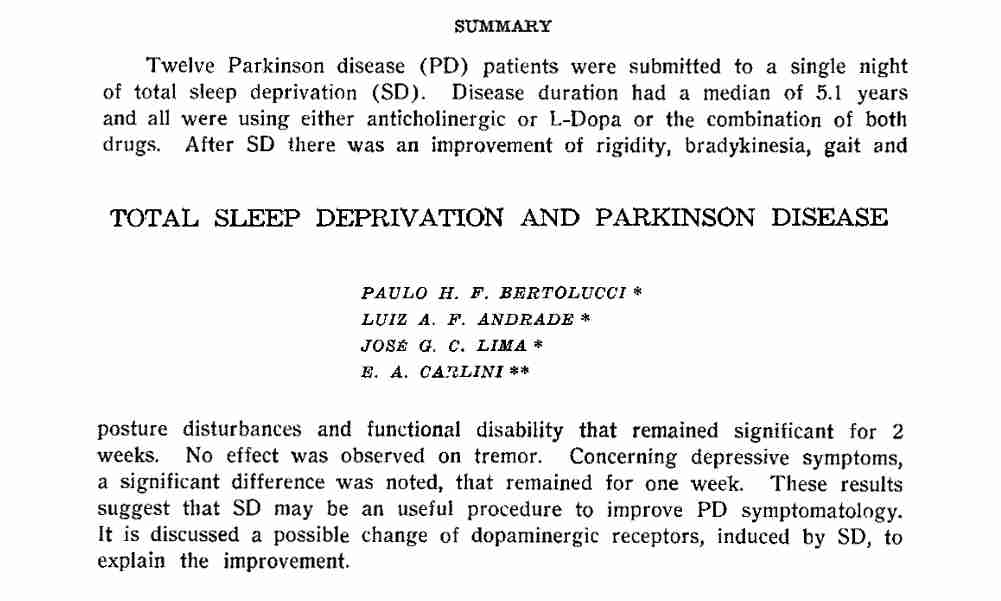INCLINED BED THERAPY http://www.youtube.com/watch?v=u3D7tBQfCxQ
For People With Parkinson’s Disease.
A person with Parkinson’s experiences many sleep related problems. Often waking paralysed following what should have been a restful nights sleep. On waking a partner or carer will help the person suffering from morning paralysis to sit up. Now their posture has been altered to make use of gravity’s beneficial influence on the circulation and some recovery is achieved. Then the legs are moved to the edge of the bed and the feet placed on the floor. Again additional recovery from paralysis is observed. Eventually when helped to stand the person with PD becomes able to move around the home and throughout the day will become more normal in function and in some cases you would hardly realise they have PD.
Only to return to the same repetitive degenerating sleeping posture and each night the PD symptoms gradually deteriorate the person’s ability to function normally.
Yet when the bed is elevated at the head end by 6-8 inches to produce a five degree to the horizontal angle, Parkinson’s Disease is observed to improve each morning and Morning Paralysis ceases to become a problem.
We need to test this therapy on a group of who have Parkinson’s Disease! My question is: Are you willing to think outside of the box and test this simple intervention?
Andrew K Fletcher United Kingdom
Sleep Problems Linked to Parkinson’s Disease
Doctors have identified a number of common sleep problems that affect people with Parkinson's disease. Including
- Restless legs syndrome (RLS) Ekbom syndrome. Parkinson's disease is often associated with RLS. This condition causes tingling or burning sensations in the lower extremities that can create an uncontrollable urge to jerk and move about while sleeping, disrupting the quality of sleep.
- Nighttime rigidity, stiffness, or tremors. Severe muscle tremors or profound muscle rigidity can awaken people with Parkinson's disease throughout the night.
- Frequent urination. Some people with Parkinson's disease find themselves needing to urinate throughout the night, which can interfere with sleep.
- Nightmares. Parkinson's disease medication like levodopa/carbidopa (Sinemet, Atamet, and Parcopa), and amantadine (Symmetrel, Symadine) can cause intense nightmares that disrupt sleep. Permax (pergolide) is another Parkinson's medication that causes nightmares, but it's no longer available in the United States.
- Depression. Depressed mood is a common side effect of Parkinson's disease, and depression can reduce your ability to sleep well. People with depression often wake up in the middle of the night and have trouble getting back to sleep.
- REM (rapid eye movement) sleep behavior disorder. Because of neurological changes caused by Parkinson's disease as well as medication side effects, people with the condition may act out sequences from dreams during their sleep. The part of the brain that regulates movement during sleep is affected by Parkinson's, Pituch explains, and this can lead to uncontrolled activity.
- Daytime sleepiness. Parkinson's disease and the medication used to treat symptoms can cause marked drowsiness during the day. In some instances, daytime sleepiness may occur so abruptly, it can even resemble narcolepsy, a sleep disorder that causes sudden, uncontrollable episodes of sleep. If people with these particular symptoms end up taking long naps, it can be difficult to get a full night's sleep.
( Inclined Bed Therapy reduces and prevents these sleep related Parkinson's disease symptoms )
--------------------------------------------------------------------------------------------------
Results Written shortly after 911 tragedies:
Inclined Bed Therapy Results with Parkinson’s Disease
Some 6 weeks ago I was asked to go to the home of an elderly couple in Torquay.
On arrival, I was introduced to a man who has advanced Parkinson's Disease. He was unable to hold a conversation, suffered from Bowel and Bladder incontinence, and had severe swelling of the abdomen and lower limbs, caused by fluid retention. His face covered in red blotches and carrying a mask of pain. He was housebound and unable to walk with out assistance and support, using a stair lift to reach the upper floor.
Life for this couple is a continual 24/7 struggle.
Some 5 years previous they had read about my work and were approached by a friend whom I was helping with the inclined bed and advised to give it a try at least. The lady said to me that she did not think it applied to everyone and thought that it was too simple an idea to even consider. 5 years later she kneeled down and prayed for a sign. On a Sunday Morning she read the article in the Sunday Independent Newspaper relating to John Caan's continued recovery from a spinal cord injury while using the inclined bed.
Strangely enough she said that she had read all of the news items, and there are many, but still thought at the time that it still did not apply to them-selves?
The very next day I received an amazing call to say that following the best nights sleep she could remember she turned to face her husband and saw that his face had completely altered, there was no pain and the mask of Parkinson's had left. When her husband awakened they had a conversation for the first time in almost a year.
4 weeks later another equally amazing call revealed that her husband had begun to walk in the home and that he had lost two and a half stones of fluid from his body. He now had toes on his feet, which were previously covered by swollen skin, which had flowed out over his feet.
5 weeks yet another amazing call. This time she was talking to her neighbour outside of her home when her husband walked by and continued up the hill with a near normal walking action instead of the Parkinson's Shuffling movement normally observed.
6 weeks I went without appointment to their home to see the changes for myself. I rang the doorbell and was greeted by a man whom six weeks ago could not talk. I asked him "How are you"? and he replied; "much better now thank you, would you like to talk to my wife, I'll just give her a call". I then stood with disbelief as I watched him walk up the stairs with ease, ironically by the side of his stair lift and call his wife's name, he then turned around and walked down the stairs in an uninterrupted normal pace. His approaching figure transformed from the swollen motionless figure of 6 weeks previous.
His medication has now been reduced to half, because we believe that some side effects of totally out of character actions could have been caused by an overdose of drugs. This had the desired effect and worked within a few days, bringing control back with it.
He now wanders off from time to time to see his grandson playing football at the local school, he visits friends and family much to the amazement of everyone who knows him.
No matter how many times I hear or witness these unfolding stories they never cease to amaze and inspire me to continue with this important discovery. And I sincerely hope that this letter to you all will help in someway to lift the shroud of gloom and evil that surrounds the world today.
Andrew K Fletcher

What happens when flat bed rest is avoided during a sleep deprivation experiment?
http://cat.inist.fr/?aModele=afficheN&cpsidt=1101196
Effect of sleep deprivation on motor performance in patients with Parkinson's Disease
Auteur(s) / Author(s)
HÖGL Birgit (1) ; PERALTA Cecilia (2) ; WETTER Thomas C. (1) ; GERSHANIK Oscar (2) ; TRENKWALDER Claudia (1) ;
Affiliation(s) du ou des auteurs / Author(s) Affiliation(s)
(1) Max Planck Institute of Psychiatry, Neurology Department, Munich, ALLEMAGNE
(2) Extrapyramidal Diseases Section, Centro Neurológico, Hospital Francés, Buenos Aires, ARGENTINE
Résumé / Abstract
Animal research provides evidence that sleep deprivation influences the dopamine system. Knowledge about the effect of sleep deprivation on motor performance in patients with Parkinsons disease is scarce. This study examines the influence of total and partial sleep deprivation compared to normal sleep on motor state and performance in Parkinson's disease. Fifteen nondepressed patients with Parkinson's disease underwent one night of total sleep deprivation (TSD), one night of partial sleep deprivation (PSD) after 3 a.m., and one control night of normal sleep (S), performed in a random, nonconsecutive order. Over a period of 3 hours the following morning, motor evaluations (United Parkinson's Disease Rating Scale. [UPDRS] and tapping rate) were performed before and every 30 minutes after intake of the usual morning dopaminergic drug dose. All patients underwent polysomnography apart from the sleep deprivation protocol. Mean UPDRS motor scores and tapping velocities did not differ significantly after each of the schedules, but a subgroup of four patients improved their motor score after partial sleep deprivation. These data do not confirm previous findings of an overall positive influence of sleep deprivation on motor function in Parkinson's disease. However, the results indicate that different response types to sleep deprivation may exist and that a subgroup of patients could benefit from partial sleep deprivation.
Revue / Journal Title
Movement disorders ISSN 0885-3185
Source / Source
2001, vol. 16, no4, pp. 616-621 (33 ref.)
